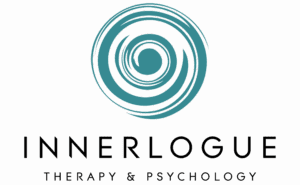Men’s Mental Health and Counselling Therapy in Calgary
According to the World Health Organization (WHO), men are significantly less likely than women to seek help for mental health issues, with only 1 in 4 men facing psychological challenges reaching out for professional support. Does this mean men don’t need therapy? Or that therapy is reserved for women? Like women, men go through difficult times: work-related stress, family pressure, existential doubts, or simply the weight of daily life. Yet, the absence of men in mental health professionals’ offices remains puzzling. So, why this reluctance to consult a therapist? The answer lies largely in the persistent stigma surrounding men’s mental health. At Innerlogue Therapy and Psychology, we explore the stigma surrounding men in therapy and reveal why it’s one of the most beneficial decisions a man can make for himself and those he loves.

The Stigma Surrounding Men and Therapy
Despite growing awareness of mental health, many men still hesitate to seek help due to stigma. Societal expectations often reinforce the idea that men must be strong, unemotional, and self-reliant, making it difficult for them to admit to psychological struggles. This stigma can prevent men from accessing professional support, leading to untreated issues like depression, anxiety, and stress-related health problems. The reasons why men avoid seeking help are numerous and varied, but many can relate to one or more of the following:
Traditional Masculinity Norms and Their Impact
From childhood, men are taught to be strong, independent, and resilient. Phrases like “Real men don’t cry” or “Be tough” are deeply ingrained in cultural narratives, reinforcing the idea that expressing emotions or asking for help is a sign of weakness. These traditional norms create immense pressure, discouraging men from acknowledging their vulnerability. As a result, many choose to suffer in silence rather than risk being perceived as weak.
Fear of Social Judgment
Society often scrutinizes men who admit to psychological struggles. Seeking therapy is sometimes seen as an admission of failure or an inability to handle personal challenges. This fear of judgment is particularly strong in workplaces and social circles where competition and self-image are highly valued. Men may worry that seeking help will make them appear unstable, incapable, or overly emotional in the eyes of their peers, further reinforcing the stigma and preventing them from reaching out.
Misconceptions About Therapy
Many men hold misconceptions about therapy, believing it’s only for those with severe mental illnesses like PTSD or schizophrenia. Others see it as a space for complaining without taking action or as a place where they must expose their deepest emotions, which contradicts the image of the rational, self-controlled man. These misconceptions, fueled by negative cultural portrayals and a lack of awareness, discourage men from exploring therapy as a practical tool for personal growth. In reality, therapy offers structured strategies to build mental resilience, problem-solving skills, and overall well-being. At Innerlogue Therapy and Psychology, we help you regain control and become the best version of yourself.
Why Men Should Consider Therapy
Men often seek help for specific challenges that affect their daily lives and relationships. Here are some key areas where therapy can make a significant difference:
- Emotional Regulation
Many men struggle to identify and manage their emotions due to societal norms that discourage emotional expression. Therapy helps them recognize and name their emotions, develop healthy coping mechanisms, and improve emotional intelligence to better navigate life’s challenges.
- Anger Management
When left unmanaged, anger can lead to destructive behaviors and strained relationships. Therapy provides tools to understand the root causes of anger, learn techniques to de-escalate intense emotions, and channel anger into constructive actions rather than harmful outbursts.
- Family Relationships
Family dynamics can be complex, and men may face challenges in maintaining healthy relationships with parents, siblings, or children. Therapy can help improve communication, resolve conflicts and misunderstandings, and establish boundaries while maintaining strong emotional connections.
- Couples Counseling
Marital issues, such as communication breakdowns, trust issues, or differing expectations, can strain relationships. Couples therapy offers a space to address unresolved conflicts, rebuild trust and intimacy, and strengthen the partnership through better mutual understanding.
- Addictions
Addictions to substances (alcohol, drugs) or behaviors (gambling, pornography) can have devastating effects on a man’s life. Therapy provides a nonjudgmental space to explore the underlying causes of addiction, strategies to overcome dependency and support for long-term recovery and relapse prevention.
- Workplace Stress
The pressure to perform, meet deadlines, or navigate office politics can lead to burnout and anxiety. Therapy helps men develop stress management techniques, improve work-life balance, and build resilience to handle professional challenges effectively.

Different Forms of Therapy Tailored to Men’s Needs
Therapy can take many forms, each adapted to the specific needs of men. At Innerlogue Therapy and Psychology, we are proud to have therapists specialized and trained in these approaches to provide personalized and effective support. Here are some of the modalities we offer, backed by the expertise of our professionals:
Individual Therapy: a safe space to explore thoughts, emotions, and behaviors. Individual therapy helps men better understand themselves and develop strategies to overcome challenges. Our therapists, trained in individual therapy, guide you with compassion to help you grow and achieve your personal goals.
Eye Movement Desensitization and Reprocessing(EMDR): Eye Movement Desensitization and Reprocessing is a powerful therapy that helps men process trauma, reduce anxiety, and overcome negative beliefs by using bilateral stimulation to reprocess distressing memories. It provides a nonverbal, structured approach to healing, making it ideal for men who may struggle to express emotions verbally. At Innerlogue Therapy and Psychology, our certified EMDR therapists offer a safe space for men to build resilience, improve emotional regulation, and achieve personal growth.
Couples Therapy: focused on improving marital relationships, couples therapy helps partners communicate more effectively and resolve conflicts. Our couples therapists, experienced in mediation and communication techniques, guide you in strengthening your relationship and restoring harmony.
Cognitive Behavioral Therapy (CBT): CBT is a structured approach that helps men identify and modify negative thought and behavior patterns. It’s particularly effective for managing anxiety, depression, and anger. Our CBT-certified therapists support you in transforming your thoughts and behaviors into positive tools, enabling you to better manage emotions and daily challenges.
Mindfulness-Based Therapy: a practice that teaches men to be present in the moment and manage stress through relaxation and meditation techniques. Our mindfulness specialists, trained in stress and anxiety management, guide you in cultivating serenity and mental clarity while strengthening emotional resilience.

How can men find the right therapist for their needs?
Finding the right therapist involves researching professionals specializing in men’s mental health, reading reviews, and scheduling initial consultations to assess compatibility. It’s important to choose someone who makes you feel comfortable and understood.
Deciding to pursue therapy is more than an act of courage—it’s a step toward a more fulfilling, authentic, and balanced life. By breaking the chains of stigma and challenging toxic masculinity norms, men can reclaim the power to understand their emotions, strengthen their relationships, and face life’s challenges with resilience.
Therapy is not a sign of weakness but a demonstration of strength and a commitment to self-improvement. It offers a safe space to grow, reconnect with oneself, and ultimately give the best of oneself to others. Because taking care of your mental health is also taking care of those you love.
Common Questions Regarding Men’s Therapy
Why are men less likely to seek therapy than women?
- Masculinity norms: Men are often raised to be strong, self-reliant, and stoic, which discourages them from asking for help.
- Fear of judgment: Many fear being perceived as “weak” or “unstable” by their peers or society.
- Misconceptions: Some believe therapy is only for “seriously ill” individuals or that it’s ineffective.
Is therapy only for men with severe mental illnesses?
No, therapy is for everyone. While it can help with serious conditions like PTSD or depression, it’s also beneficial for managing everyday stress, relationship issues, and personal growth. It provides a safe space to address challenges like anxiety and depression, helping men lead more balanced and fulfilling lives. Therapy is a proactive approach to improving mental resilience and overall well-being.



